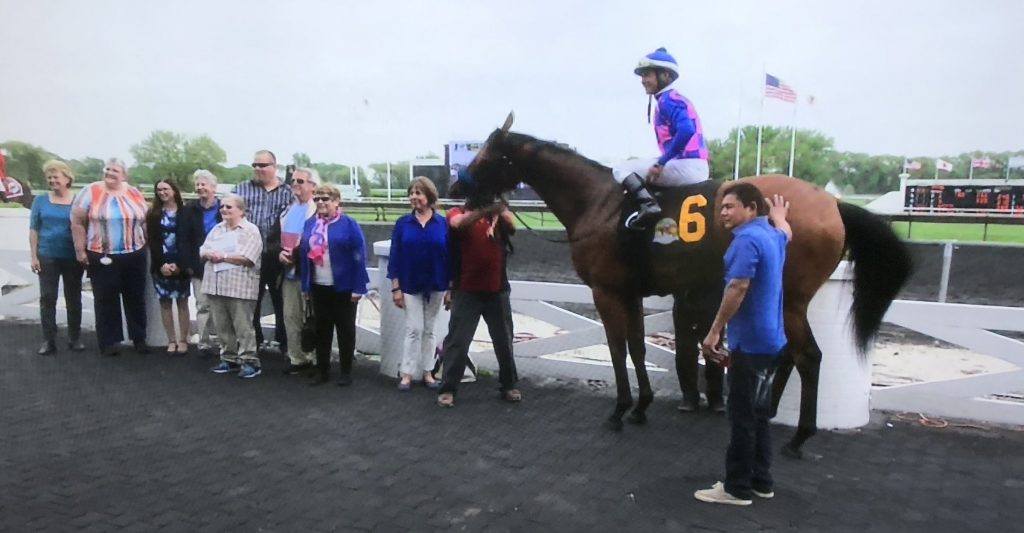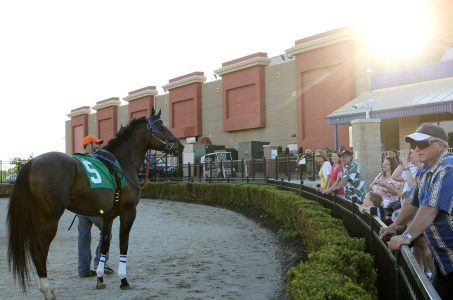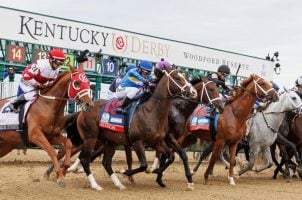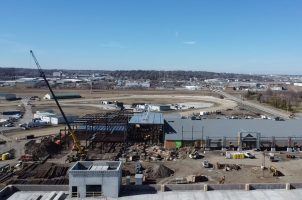Illinois Horsemen ‘Blindsided’ by Churchill Downs Want State to Protect Arlington
Posted on: October 23, 2019, 07:21h.
Last updated on: October 24, 2019, 10:06h.
Horsemen in Illinois say they are still reeling from the decision by Churchill Downs Inc. not to pursue a casino license for Arlington International Racecourse, and they want the state to take action.

Earlier this month, Mike Campbell, president of the Illinois Thoroughbred Horsemen’s Association (ITHA), wrote an op-ed piece saying state gaming officials should take action against the company. Last month, the group wrote a letter to the Illinois Gaming Board (IGB), urging it to deny Churchill Downs a sports betting license for the Arlington Heights track or any other venue it owns.
Arlington had a chance to pursue a casino license and sports betting this year after the state legislature passed an expanded gaming law. For horsemen, it was a legislative victory they had wanted for years, since proceeds from track casinos would boost purses. However, before the legislature even met, Churchill Downs found a way to already get in the Illinois casino market.
Nearly a year ago, Churchill Downs purchased a majority stake in Rivers Des Plaines, a casino near O’Hare International Airport. That casino is about a half-hour drive from the track, as both are located in Chicago’s northern suburbs.
After Gov. J.B. Pritzker signed the bill into law, Churchill officials were still considering adding gaming to the track. However, they said Arlington’s tax rates would be higher than other Chicago-area casinos. That prompted them to back away in August.
Unlike casino gaming, the law does not require them to use a portion of sports betting revenues and apply them to purses.
In an interview with Casino.org, Campbell said state officials indicated Arlington could expect to take in $300 per machine per day. The state law allowed Arlington to offer up to 1,200 slots machines, plus table games. He added that Arlington also resides near the second biggest retail market in Cook County and had direct rail access to downtown Chicago.
“We were blindsided, I think, from the standpoint that it couldn’t help but be successful,” Campbell said.
Churchill Downs did not return a request for comment.
Churchill Wants Time
Last month, the Illinois Racing Board (IRB) postponed a vote on scheduling racing dates for 2020 in an attempt to work out a solution with Churchill Downs regarding its plans for Arlington. However, a week later, after Churchill Downs said it needed time to evaluate what would be best for Arlington, the IRB voted unanimously to keep the 2020 dates as planned, with Arlington getting 68 racing days.
In the IRB meeting, Churchill Downs noted that it waited for years to add historical horse racing in its hometown of Louisville, even though the machines were successful at other Kentucky tracks.
While IRB members were not happy with Churchill’s action, some felt they needed to give Churchill that time. Though there was some discussion about withholding Arlington’s dates, they felt that such a decision would be punitive toward the horsemen who rely on Arlington’s race dates for their livelihoods.
When asked if the IRB wants to see Churchill move forward with a commitment to casino gaming before awarding dates for 2021, executive director Domenic DiCera told Casino.org his agency will examine “year-by-year” what is best for the industry.
Applications for 2021 racing dates won’t be due until July 31.
“Not until that moment will we know what Arlington or Churchill’s intentions are,” he said,
Not Just Arlington
While the Arlington situation might be the most pressing for Illinois horsemen, it’s not the only racing or gaming issue affecting them.
Last week, Gov. J.B. Pritzker notified officials in Tinley Park, a southern Chicago suburb, that state-owned land in the community being considered for a racino was no longer for sale. That decision came after the Chicago Tribune reported the aspiring owner of the planned harness track and casino had substantial dealings with a banker who has purported ties to organized crime.
That means a harness racing track that could have opened late next year is now up in the air.
Harness racing currently operates out of Hawthorne Park, as does thoroughbred racing. However, without casino revenues supplementing the Arlington purses, and without a harness racino, that means the casino proceeds set aside for racing will have to be split between the two groups, ITHA executive director David McCaffrey told Casino.org.
Everyone will still get some benefit, but not nearly what was hoped for when the bill passed.
In a way, the last two or three months have sort of been a microcosm of horse racing in general,” he said. “In that, it’s such a game of ups and downs. Your horse is in a good spot and he gets sick, or your jockey, who is the leading jockey at the track, is sick today and you have to put up a rookie and he gives the horse a bad ride. Or, you win the race and then there’s an inquiry.”
He said that some younger horsemen have decided to move on to other states. But for some, they’re already committed. Take, for example, breeders who have stayed in Illinois to have their mares produce foals strictly to take advantage of races and bonuses for Illinois-bred horses at in-state tracks.
Some of those decisions took place years ago in hopes casino gaming would come to fruition and boost purses. Others became committed once Pritzker signed the bill into law.
“People made plans,” he said. “People committed to Illinois in certain ways. So those people really have felt that the rug was pulled out from under them.”
Related News Articles
Churchill Downs to Acquire Two Eldorado Resorts Casinos
Churchill Downs Top Gaming Growth Story, Says Analyst
Most Popular
FTC: Casino Resort Fees Must Be Included in Upfront Hotel Rates
Genovese Capo Sentenced for Illegal Gambling on Long Island
NBA Referees Expose Sports Betting Abuse Following Steve Kerr Meltdown
UPDATE: Former Resorts World & MGM Grand Prez Loses Gaming License
Most Commented
-
UPDATE: Whiskey Pete’s Casino Near Las Vegas Closes
— December 20, 2024 — 31 Comments -
Caesars Virginia in Danville Now Accepting Hotel Room Reservations
— November 27, 2024 — 9 Comments -
UPDATE: Former Resorts World & MGM Grand Prez Loses Gaming License
— December 19, 2024 — 8 Comments -
FTC: Casino Resort Fees Must Be Included in Upfront Hotel Rates
— December 17, 2024 — 7 Comments
















Last Comment ( 1 )
Here's an out of the box idea for u. And it's a cant miss idea. Since every bathroom laundromat restraint. Bar. Have slot machines. Open a major poker room. Take a look at losangles. Commerse. Bike. Hollywood park. Hiwian gardens. No way it wouldnt work along with sports betting. Jump on it b for someone smartened up